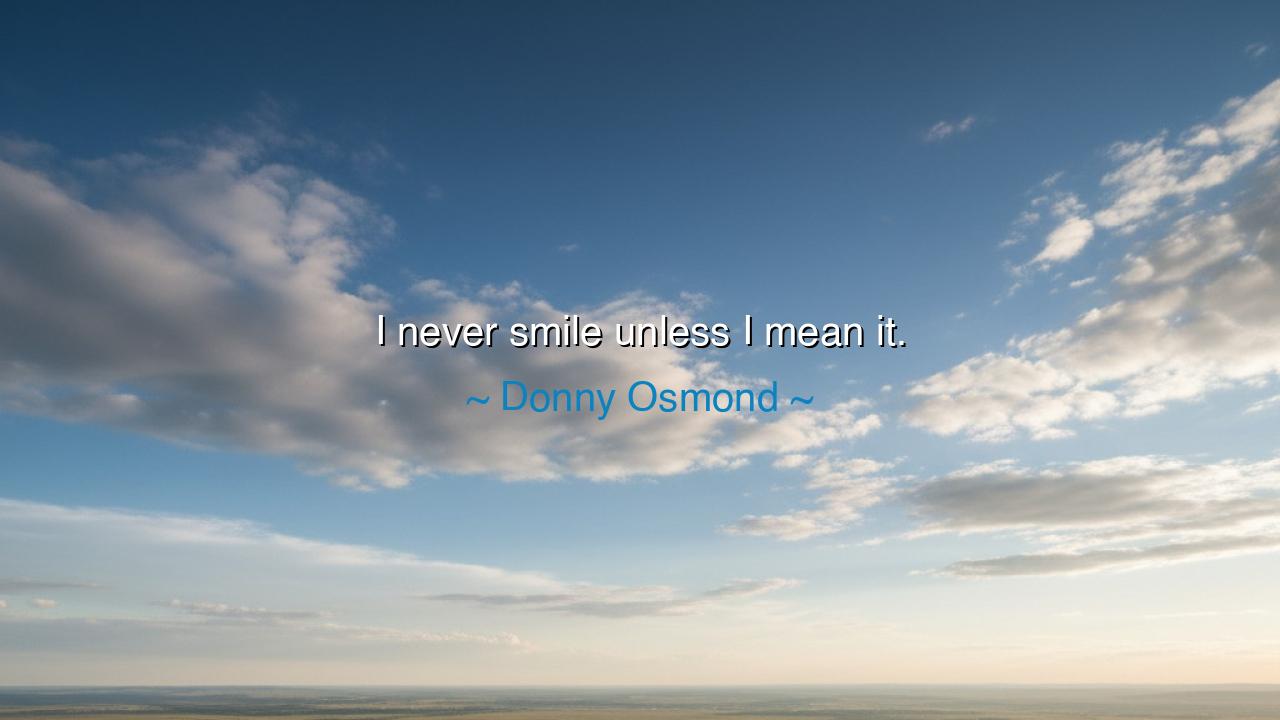
I never smile unless I mean it.






Hear the words of Donny Osmond, spoken with simplicity but carrying the weight of integrity: “I never smile unless I mean it.” This is no idle boast, but a declaration of authenticity, a vow to let the face reflect only what is true in the heart. For the smile is sacred—it is the outward sign of joy, of peace, of kindness—and to use it falsely is to make it a mask, a deceitful tool. Osmond, a man often in the public gaze, chose not to counterfeit what should be pure. He proclaimed that his smile is not for performance, but for truth.
The ancients too warned of false expressions. In the Proverbs it is written, “A lying tongue hates its victims, and a flattering mouth works ruin.” They knew that a false smile, though it may bring advantage for a moment, erodes trust and dishonors the soul. Better, they taught, to show honest sorrow than to wear a mask of joy without truth. The smile must be an emblem of sincerity, or it loses its power. Thus Osmond’s words, though modern, echo the wisdom of prophets and sages: let your countenance be as true as your heart.
Consider the tale of Julius Caesar. When he walked among his senators, many smiled at him, but their hearts were filled with envy and betrayal. Their smiles were daggers hidden in silk, and when the moment came, they struck with treachery. History remembers their crime not only for the act, but for the falseness of their faces before it. Caesar’s fall teaches us this lesson: a smile that is not meant is dangerous, for it hides the serpent beneath the flower.
But there are also stories of the power of true smiles. Think of Mahatma Gandhi. His face, worn with fasting and hardship, still bore a smile that flowed from the depths of conviction. It was not a mask, nor a performance, but the pure reflection of his soul’s peace. That smile inspired multitudes, giving them courage to endure suffering without violence. Gandhi “meant” his smile, and because of its truth, it carried power greater than weapons. This is the essence of Osmond’s declaration: sincerity gives the smile its authority.
The meaning of the quote is therefore clear: a smile must be an act of truth. To use it as flattery, manipulation, or disguise is to weaken the bond between face and spirit. But when it is genuine, it becomes one of the most powerful gestures in the human world. It heals, it strengthens, it inspires, for people recognize instinctively when they are in the presence of honesty. Osmond’s words are a reminder that in a world full of masks, authenticity is rare and precious.
The lesson is this: let your expressions reflect your true heart. Do not counterfeit joy when you feel bitterness, and do not feign kindness when your spirit is cold. Instead, cultivate within yourself the virtues of peace, love, and gratitude, so that when you smile, it is born from truth. For a single sincere smile is worth more than a thousand false ones.
Practical action follows easily: live each day with integrity of heart and face. When you feel sorrow, allow it to be seen without shame. When you feel joy, let your smile shine forth, for in that honesty you will bless others. And when you give a smile, let it be real, so that those who see it may know they are standing before a person who values truth above appearance.
Thus, Osmond’s words should be carried forward as a banner: “I never smile unless I mean it.” For in this saying is the path of authenticity, the courage to be true in a world of pretenses. A genuine smile is not only more beautiful, it is more powerful—it is the language of the soul, spoken only when the heart commands it.






AAdministratorAdministrator
Welcome, honored guests. Please leave a comment, we will respond soon